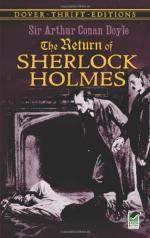Our search was not a very long one. The tracks of the tire began to curve fantastically upon the wet and shining path. Suddenly, as I looked ahead, the gleam of metal caught my eye from amid the thick gorse-bushes. Out of them we dragged a bicycle, Palmer-tired, one pedal bent, and the whole front of it horribly smeared and slobbered with blood. On the other side of the bushes a shoe was projecting. We ran round, and there lay the unfortunate rider. He was a tall man, full-bearded, with spectacles, one glass of which had been knocked out. The cause of his death was a frightful blow upon the head, which had crushed in part of his skull. That he could have gone on after receiving such an injury said much for the vitality and courage of the man. He wore shoes, but no socks, and his open coat disclosed a nightshirt beneath it. It was undoubtedly the German master.
Holmes turned the body over reverently, and examined it with great attention. He then sat in deep thought for a time, and I could see by his ruffled brow that this grim discovery had not, in his opinion, advanced us much in our inquiry.
“It is a little difficult to know what to do, Watson,” said he, at last. “My own inclinations are to push this inquiry on, for we have already lost so much time that we cannot afford to waste another hour. On the other hand, we are bound to inform the police of the discovery, and to see that this poor fellow’s body is looked after.”
“I could take a note back.”
“But I need your company and assistance. Wait a bit! There is a fellow cutting peat up yonder. Bring him over here, and he will guide the police.”
I brought the peasant across, and Holmes dispatched the frightened man with a note to Dr. Huxtable.
“Now, Watson,” said he, “we have picked up two clues this morning. One is the bicycle with the Palmer tire, and we see what that has led to. The other is the bicycle with the patched Dunlop. Before we start to investigate that, let us try to realize what we do know, so as to make the most of it, and to separate the essential from the accidental.”
“First of all, I wish to impress upon you that the boy certainly left of his own free-will. He got down from his window and he went off, either alone or with someone. That is sure.”
I assented.
“Well, now, let us turn to this unfortunate German master. The boy was fully dressed when he fled. Therefore, he foresaw what he would do. But the German went without his socks. He certainly acted on very short notice.”
“Undoubtedly.”
“Why did he go? Because, from his bedroom window, he saw the flight of the boy, because he wished to overtake him and bring him back. He seized his bicycle, pursued the lad, and in pursuing him met his death.”
“So it would seem.”
“Now I come to the critical part of my argument. The natural action of a man in pursuing a little boy would be to run after him. He would know that he could overtake him. But the German does not do so. He turns to his bicycle. I am told that he was an excellent cyclist. He would not do this, if he did not see that the boy had some swift means of escape.”




